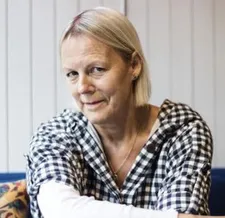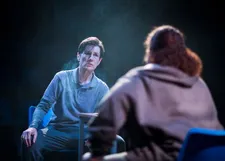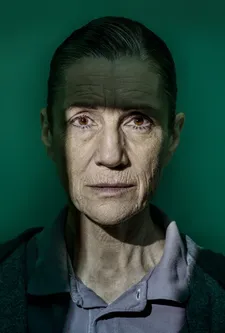_I2K8yud_600.webp) |
| Harriet Walter as Brutus. Phyllida Lloyd: 'The project was originally to try to help redress the imbalance of opportunities for women in the theatre' Photo: Helen Maybanks |
Director Phyllida Lloyd is a champion of strong women's roles, with films including Mamma Mia! and The Iron Lady. In Julius Caesar, she captures the all-women production from Donmar Warehouse, starring Harriet Walter and Jackie Clune as Brutus and Caesar and framed as a production of the Shakespeare play within a women's prison. The result, which was shot over multiple nights is, though not a film in the traditional sense, a lot more than you might expect from a 'filmed play'. I caught up with Lloyd as the film premiered at Edinburgh Film Festival, to talk about the project.
Amber Wilkinson: Can you tell me a bit about the origins of the theatrical project. The female casting works very well, not least because the play itself only has two female characters, but I'm interested in what drew you to it.
Phyllida Lloyd: The project was originally to try to help redress the imbalance of opportunities for women in the theatre. Harriet Walter, who was the original foundation of the casting, had really run out of road in classical theatre at her age. I chose the play because I thought that if you did the play with all-women, it would mean that almost everybody was free from the usual romantic and domestic role they normally got to play. It was almost Shakespeare's most macho play.
The decision to set it in a women's prison, was to try to help both the audience and the actors believe the action. That somehow by putting it in a prison, the women were all immediately androgynous because they were all in uniform and when we went into prison with the play to workshop it with prisoners, we realised that their obsessions with freedom and justice, and their sense of apprehension of danger and their experience of violence all connected them to the play and they found the play very, as they described it, 'suitable' to their interests.
AW: Some of the reviews of the initial stage production by what might be considered "male pale and stale" critics, seemed to simply turn on the play on the grounds that you had had the temerity to put women in all the roles.
PL: There's no doubt it's a sort of blast at the establishment. At the establishment itself in terms of power and leadership but also in the theatrical establishment. Those roles of Brutus, Cassius and Caesar are sort of handed down from man to man and have been since the 16th Century. So I think we definitely knew we were stepping on toes.
 |
| Director Phyllida Lloyd Photo: Courtesy of Trafalgar Releasing |
AW: Talking about he prison element, I was very struck by how this interpretation of the play really brings to the fore, the idea of things never being quite finished and the inability to get any sort of closure.
PL: I think that sense that nothing can be completed really came from our working in prison. When we first went into Holloway, we'd start a session on Julius Caesar and people would be being removed literally from the room and taken away to another prison or taken away to court. Even the space that we were working in used to get suddenly changed - you'd realise, "Sorry, this is being used as a faith space, you shouldn't be in here, can you all leave." Or, "We've got a lockdown, can every just vacate the premises?"
So, yes, this sense that the system is somehow ultimately in charge and however powerful you might feel for the moment, the land under your feet is constantly shifting. Also, this is sort of going back to my point originally about locating the work in a prison. The other benefit of it was in terms of breaking the mould. Who has rights to play these roles? Often, posh white boys. In prison there is the whole world, so that sense of the global village that's on the stage - the different accents, the different nationalities - it just, somehow, broke open that very middle-class university-educated pattern.
AW: Apart from the fact there's no men, it's a very diverse production.
PL: Yes, and only five of those 12 actors had ever done Shakespeare before.
AW: Does that make a difference for you, when you're working with people who have never done Shakespeare?
PL: No, because they were all chosen because, despite their lack of practice at it, they all had an instinctive feeling for it. We found that some of the people who had the least conventional educations were some of the ones who made a direct beeline to it and understood it most readily. I think that's something that we've been able to hand on to schoolkids. The fact that you can own this stuff. You don't have to have a posh voice, you don't have to assume BBC English in order to do it. You just have to get out there and try it in your mouth.
AW: When deciding to film it, you could go down the route of deciding to do a full film and trying to raise the money for that, but you decided to go down the route of filming the production, why was that?
 |
| Phyllida Lloyd: 'I wanted to get, not just in close, but over the shoulder' Photo: Helen Maybanks |
I felt that as a legacy, because we wanted to extend the work into schools and prisons, that it was really important to make a record of it. But beyond that, not just, as they call it 'capture it' - and I hate that expression - but to try to make something that did have more energy, where the camera did go to places that the audience couldn't get to. We were well-served by the fact that we were performing in the round, so the camera could go in right on the eye-line - and I think that's something you feel, particularly Harriet and Martina Laird, playing those Brutus/Cassius scenes. You're able to get reverses.
AW: There is a clear filmmaking sensibility behind it. it's not just a recording. The way that, for example, the way you can get a close-up, which if you're in a theatre, unless you've got your opera glasses with you, you wouldn't get.
PL: I wanted to get, not just in close, but over the shoulder. So you're looking at Harriet and there's no camera behind her because I shot the reverse on another night. So it's cut together like a film across different nights. I think that made it feel more filmic. Also, the use of GoPro. We had 10 half days of additional shooting, handheld and using GoPros on the actors in some of the performances. That was all to try to somehow mirror the edginess and the instability of the environment itself.
AW: If someone had come to you and said they wanted you to make a film of this play with these actress, but literally a film rather than a filmed play, would you have wanted to do that. Or did you see the value in doing it this way?
PL: I did, in that there's a kind of pressure cooker about the prisoners being brought to this place to perform in this time. That somehow that ticking clock, that the audience are really sitting there watching it is part of the tension of the recording of it. I think there is a film about Shakespeare in prison and women performing it but, in this instance, to try to record all the plays, to take that all on to location would have been a massive undertaking.
AW: It gives you a real sense of the physicality of the acting, that perhaps we don't always think about.
PL: It's interesting, you think, in cinema, it's very rare to see a film in which women are playing all the roles. It's very rare to see the transgender, right across the board in a movie. So, you think, what if you took the camera in and none of them are wearing make-up? And none of them are. So in those gestures, you're breaking open quite a lot of tradition in terms of movie making. If you went to a distributor and said, 'I want to make a film. It's all women and none of them really have international distribution chops' they'd kind of laugh at you. So, in that sense, by getting this out there, we're intending to try to break open, in a tiny way, these ideas.
AW: Do you think the situation is improving, in terms of women's ability to get these bigger roles, behind and in front of the camera? As far as I can see, it's a constant, real battle, that we're not getting very far with.
PL: I think it's scary. I went to a film panel yesterday and the statistics were shared. It is alarming that something like seven per cent of films in a whole year in Hollywood are directed by women. Something like 35 per cent of films from the States did not have a woman in any lead role in any department, well, maybe make-up, but there was no cinematographer, no producer, no writer, no director. It's just astonishing.
 |
| Phyllida Lloyd: 'The decision to set it in a women's prison, was to try to help both the audience and the actors believe the action' Photo: Nadav Kander |
PL: I think its the whole issue of distribution worldwide. There was someone on the panel yesterday, a woman who deals with foreign sales. She was saying that the first question she's asked in all the territories, is, 'Who's the male lead?'. If you go, 'Actually, it's a film about a woman', they say, 'Sorry, yes, I know all that, but who's the male lead?'.
I'm trying to get a low-budget film off the ground at the moment and I need to get an actress into a particular role who has some kind of international credentials and the list of women who you are even allowed to consider is like that [gestures small amount] whereas when the producer said, 'Do you think you should consider changing the part into a man because the list is like this [gestures very long list]' how many more doors it would open. But you wonder whether this is real in terms audiences. Whether this is really what audiences want.
AW: It's interesting that that is a hidden pressure, something that nobody outside of your job would see. If they're basically nudging people to casting men over women because of the perceived ease of it.
PL: When I made Mamma Mia!, then, the resistance of Hollywood to the age of those women - Christine Baranski, Julie Walters and Meryl Streep. There were saying, 'Sorry, how's this going to work? These women in this film have sexy love interest, aren't these people too old for this.' And you now look and there's Christine flying with her own TV series.
Julius Caesar is out on release in the UK at selected cinemas, for details of screenings visit the official site.
- Karen Dunbar tells us about getting Serious about Caesar
- Read what Jennifer Joseph and Jackie Clune told us about breaking the mould.





















